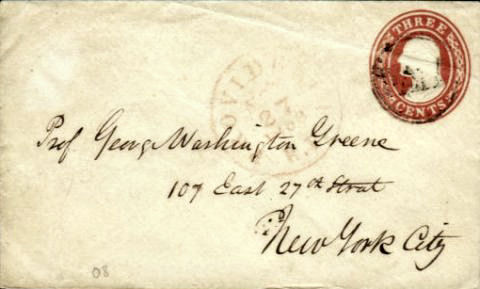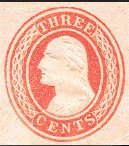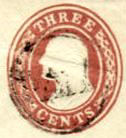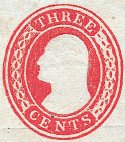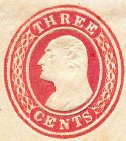![]()
Postal History Introduction
Stampless
Covers
1846
to 1900 Issues
1901-1950
Issues
1951-2003
Issues
Cancels
&
Miscellaneous
Postal
Stationery
Post
Cards
Air
Mail
First
Day &
Event Covers
Parcel Post/Special Delivery
Registered & Official Mail
Commercial & Advertising
Revenue & Postage Due
Wildlife & Game Issues
Complete List of RI Issues
|
Postal Stationary -
Embossed Envelopes and Cards |
||||||||
|
||||||||
|
This November 27, 1858 Embossed Envelope sent from Providence, RI to Professor George Washington Greene in New York City was doubly interesting to me because of the historical context, (Professor Greene was the grandson of General Nathanael Greene and taught Modern Language at Brown University) and the type of embossed stamp, which was produced in multiple varieties, (U1 through U10) and is a fascinating study in and of itself. The 1853-1855 Three Cent Washington Embossed Stationary was the first Postal Stationary produced in the United States. The cover above is on buff diagonally laid paper. The stamp is Scott #U2, which can be determined by the "THREE" Label at top. It has straight edges and is 15.5 millimeters in width. Shown below are four of the Twelve types of 1853-1855 Three Cent Washington Stamps. Each 3 cent stamped envelope was produced in both white and buff versions and in addition, early U1 types were also printed on Horizontally laid paper. (Not shown is U4, which had straight edges and was 20mm wide.) SEE ALSO: 1854 Postal Stationary - Scott #U1 - Newport CDS
George Washington Green was born in East Greenwich, Rhode Island on April 8, 1811. He was the grandson of General Nathanael Greene of Revolutionary War fame. He entered Brown University in 1824, but left in his junior year due to ill health. He resided in Europe from 1825 to 1833 and 1835 to 1847. (He returned to the East Greenwich in 1833 and taught at Kent Academy until 1834.) He was appointed United States Consul to Rome in 1837. He returned to the United States in 1848 and was appointed as a professor of Modern Languages at Brown University. Professor Greene moved to New York in 1852 and began writing historical articles for various periodicals. He edited "Addison's Works" in 1853. In 1865 he returned to East Greenwich and in 1866 was elected to the State Legislature. While serving in the legislature, he spoke eloquently concerning the ratification of the 14th and 15th amendments to the constitution. He accepted a position at Cornell University as a professor of history in 1872. Professor Green was the author of many works and books including; "Historical Studies" (1850), "History and Geography of the Middle Ages" (1851), "Biographical Studies" (1860), "Historical View of the American Revolution" (1865), "Nathanael Greene: An Examination of the Ninth Volume of Bancroft's History" (1866), "General Nathanael Greene" (3 volumes 1867-71), "The German Element in the War of American Independence" (1876), "Short History of Rhode Island" (1877), and two text books on botany and one French grammar. George Washington Green died in East Greenwich, Rhode Island on February 2, 1883. |
![]()
RI Historical Society
The Post Offices
Home Page
RI Tercentenary Issue History
RI Philatelic Society
Recently Added Pages
Philatelic Primer
Rhode Island Around the World
Rhode Island
Town Postmarks
Other Websites of Interest
